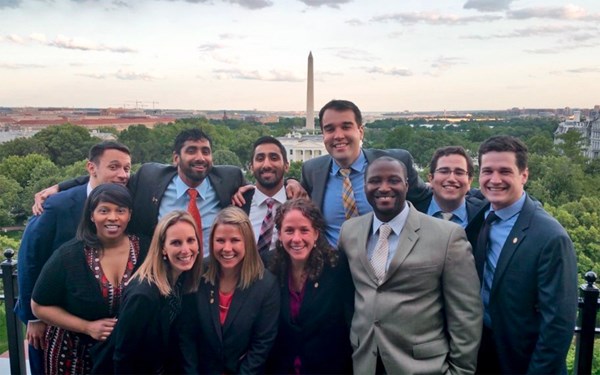On May 15-18 this year, more than 500 emergency physicians from around the country joined together in Washington, D.C., at the premier event for learning about and advocating for the key issues that impact emergency physicians and our patients. According to many attendees, this was the best year yet. The ACEP Young Physicians Section and EMRA hosted the First Timers Track, a primer on key health policy issues. This was followed by a deeper dive by some of the premier names in emergency medicine policy and advocacy. The event culminated in Leadership Day, filled with talks aimed to educate and inspire attendees to take the lead and become the driving force for future policy change. Perhaps the key event, however, was Lobby Day on the Hill, which allowed participants to apply themselves by speaking with their congressional leaders and key aides. The four main areas of focus included:
- Protecting the use of standing orders for EMS providers;
- Medical liability reform for EMTALA services;
- Mental health reform;
- The opioid epidemic.
Improving EMS Delivery of Care
As we all know, EMS is integral in the delivery of quality emergency care, and frequently, there is a need to administer controlled substances in the pre-hospital setting. Established practice has allowed appropriately trained EMS personnel to administer these medications through pre-determined protocols, commonly known as standing orders. In 1970, Congress passed the Controlled Substances Act (CSA), and recent review led to an interpretation by the Department of Justice that standing orders are not compliant with the law, threatening the ability of pre-hospital providers to deliver life saving medications without obtaining direct order via online medical control. Thus, the "Protecting Patient Access to Emergency Medications Act of 2016" (H.R. 4365), sponsored by Rep Richard Hudson (R-NC) an Rep. G.K. Butterfield (D-NC), was proposed to remedy this dilemma by protecting the use of standing orders while maintaining vigorous government oversight of storage protocols and physician oversight requirements.
Medical Liability Reform for EMTALA Services
Emergency physicians are keenly aware of EMTALA. Under this law, providers are required to treat and stabilize all patients regardless of insurance status or ability to pay. This extends to on-call consultants as well. Owing to the nature of emergencies, critical decisions often must be made with a dearth of information, leading to much higher liability exposure for emergency and on-call physicians.
Legislators were asked to co-sponsor or support "The Health Care Safety Net Enhancement Act of 2015" (H.R. 836/S.884), sponsored by Rep. Charlie Dent (R-PA) and Sen. Roy Blunt (R-MO). This bill is designed to provide liability protection to physicians for federally mandated EMTALA services rendered, similar to the protections afforded to federal health centers and free clinics, in an effort to help preserve the availability of emergency and on call physicians.
Mental Health Reform
In most states, resources for mental health and psychiatric services are simply inadequate. As a result, psychiatric patients have increasingly turned to emergency departments to seek care. Unfortunately, it often takes far more time and resources to admit a psychiatric patient than the typical medicine patient, diminishing our ability to evaluate and treat other patients awaiting emergency services. A 2008 ACEP study found that almost 80% of emergency physicians reported that psychiatric patients were being boarded in their emergency department.
Your colleagues advocated for meaningful mental health provisions that expand access to psychiatric services, including:
- Creation of an Assistant Secretary for Mental Health and Substance Use Disorders and the National Mental Health Policy Lab;
- Extension of the Assisted Outpatient Treatment grants;
- Promotion of telemedicine services;
- Elimination of Medicaid same-day and IMD exclusions;
- Expansion of the mental health workforce.
Emergency Medicine Opioid Principles
Emergency physicians see firsthand the terrible toll of the opioid epidemic – in the narcotics-seeking patient gripped by addiction, the untimely death of a patient by overdose, and the patient's distraught family and community. The U.S. Centers for Disease Control & Prevention reported that more than 28,000 Americans died of opioid overdose in 2014.
This issue is being increasingly recognized by lawmakers. As physicians on the front lines, we can help guide the pain management policies currently being developed. Your colleagues spoke with legislators regarding several key principles, including: (1) supporting evidence-based pain treatment guidelines, (2) supporting national prescription drug monitoring programs, (3) supporting lock-in programs in which beneficiaries are restricted from “doctor-shopping” and “pharmacy-shopping,” with adequate provisions for emergency care, (4) supporting modification of patient satisfaction surveys to remove subjective pain questions, and (5) supporting efforts to develop innovative alternatives to opioid pain management.
Take Action
Want to learn more about current health policy issues and what you can do to affect change? Register for the ACEP 911 Network to get weekly email updates from Capitol Hill. Go to www.acepadvocacy.org to learn about important federal and state issues, and join us next year at LAC. Don't forget your copy of the Emergency Medicine Advocacy Handbook, which can be downloaded as a free PDF.



